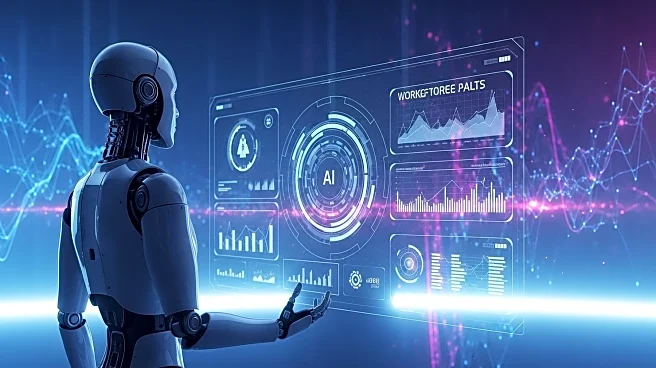What's Happening?
The HR industry is currently grappling with the integration of agentic AI, a new form of artificial intelligence that allows machines to operate autonomously and make decisions without constant human input. This technology is seen as a successor to generative AI, which gained prominence with the release of ChatGPT in 2022. According to industry experts, agentic AI has the potential to transform company systems, processes, and the workforce. However, many HR teams are reportedly unprepared for this shift, which is considered a missed opportunity. Kevin Fitzgerald, UK managing director of HR software company Employment Hero, highlights an education gap, noting that AI use ranks low among productivity drivers. Despite this, some companies, like Microsoft and H&M, have begun implementing agentic AI to streamline operations and reduce time-to-hire. The HR sector is encouraged to experiment with agentic AI tools to avoid falling behind.
Why It's Important?
The adoption of agentic AI in HR is significant as it promises to automate routine tasks, allowing HR professionals to focus on more strategic roles. This shift could lead to increased efficiency and productivity within organizations. However, the lack of readiness among HR teams could hinder these potential benefits. Companies that successfully integrate agentic AI could gain a competitive edge by reducing administrative burdens and enhancing decision-making processes. Conversely, those that fail to adapt may struggle to keep up with industry advancements. The ethical integration of AI, with a focus on data privacy and bias mitigation, is also crucial to ensure that AI tools are used responsibly and inclusively.
What's Next?
HR professionals are advised to start experimenting with agentic AI tools to better understand their potential impact. This involves upskilling on AI technologies and adopting a curious mindset to explore how AI can enhance HR functions. Collaboration with technology teams is essential to ensure successful integration. As organizations navigate this transition, they must prioritize ethical AI usage and involve employees and unions in the development process to foster acceptance and trust. The future of HR may see a shift from traditional roles to more strategic partnerships within businesses, driven by AI capabilities.
Beyond the Headlines
The integration of agentic AI in HR raises ethical considerations, particularly around data privacy and bias. HR leaders are urged to champion responsible AI adoption, ensuring that AI systems enhance human capabilities rather than replace them. This involves setting clear policies and governance structures to guide AI usage. Additionally, the cultural shift required for AI adoption may challenge existing workplace dynamics, necessitating a focus on employee engagement and training. As AI becomes more prevalent, HR's role may evolve from administrative support to strategic leadership, driving innovation and change within organizations.











